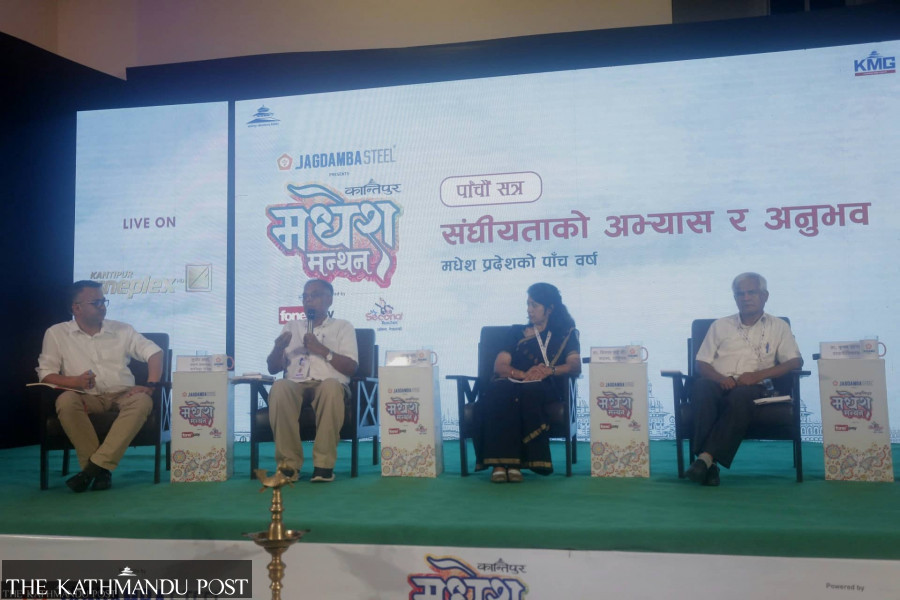National
Federal government itself is anti-federal, politicians and experts say
Panelists concur federalism can never be strengthened unless the political parties transform themselves.
Post Report
Nepal adopted a federal system of governance in 2015 to ensure that people have an easy access to administrative services, they have involvement in decision making, the identities of various communities are recognised, and there is an equitable distribution of state resources.
The Constitution of Nepal has broadly categorised the authorities and responsibilities of the three tiers of government. However, even after nearly five years of federal exercise, true federalism has yet to be practised because the federal government is very conservative about delegating the authority it has been enjoying for decades to provincial and local units, according to representatives of provincial governments and experts.
“The federal government, no matter who is leading, is guided by centralised and unitary mindset which is a huge barrier to full implementation of federalism,” Mohammad Lalbabu Raut, the chief minister of the Madhesh Province, said speaking at an interaction titled ‘Madhesh Manthan,’ in Janakpur on Saturday. “We still don’t have necessary laws, and there is a human resource crunch while the federal government has not been extending the cooperation expected of it.”
‘Madhesh Manthan,’ the one-day interaction on sustainable development, prosperity and transformation of Madhesh Pradesh, was organised by Kantipur Media Group in collaboration with the Madhesh Province government, the Ministry of Home Affairs, the Ministry of Information and Communications, and the Province Assembly Secretariat.
Speaking at the function, panelists concurred that the federal government, which is tasked with facilitating smooth implementation of federalism, is itself anti-federal.
“But despite various odds, the foundation of federalism is not weak,” said Krishna Khanal, professor of political science at Tribhuvan University. “It is evident that the federal government is working with an anti-federal mindset. However, I also don’t see provincial governments being assertive about their rights.”
Meanwhile, some speakers argued that the constitution itself was designed so as not to give powers to the provinces. “The design of provinces in the constitution is defective,” said CK Lal, a writer and analyst. “Therefore, I don’t see the provincial government functioning effectively even if there are legal and other instruments in place.” He said that no parties are voicing strongly for an effective implementation of federalism because the concept wasn’t accepted wholeheartedly.
The Nepali Congress and the CPN-UML accepted federalism as a compromise while the Madhesi parties that advocated for it aren’t in a position to pressurise for its effective implementation, and therefore are not different from the mainstream parties, according to Lal. There was a unanimous voice among the speakers that federalism can never be strengthened unless the political parties transform themselves. “Federalism is not just a political issue. It has to be a way of life,” said Vimala Rai Poudyal, a member of the National Assembly. “The parties must internalise federalism themselves first, but that is not happening.”
The interaction, inaugurated by Nepal’s first president Dr Ram Baran Yadav, had five different sessions on varied topics ranging from governance to social transformation of the Madhesh Province. Putting his views as keynote speaker, Yadav said he promulgated the constitution with a heavy heart amid deadly protests against the charter in the Tarai/Madhes. “I became happy when an environment was created for all the parties to participate in the elections,” he said. “However, after the 2017 elections, there have been several attacks on the constitution, which I believe will last for decades.”
He expressed his dissatisfaction over the dissolution of the House of Representatives, continuous obstruction in parliament and the protest in the judiciary. The erstwhile KP Sharma Oli government had dissolved the lower house twice in December 2020 and May 2021. Similarly, his party obstructed the federal parliament, leaving it paralysed for over seven months.
Yadav, under whose leadership Chure conservation efforts were initiated, said he was pained by the exploitation of the Chure region which is causing water shortage in Madhesh. “I am concerned about the warnings by experts that the entire Tarai could turn into a desert in the next three decades if exploitation of the Chure region continues at the present rate,” he said. “Let us preserve the trees, nature and our place.”
In the day-long discussion, politicians and experts discussed conserving the Chure region and forests to protect Madhesh, chewed over the problems in governance, gave their views on whether the Madhesi society had changed over the years and what could be done to rejuvenate Janakpur. The panelists argued that Madhesh wasn’t liberal in accommodating the marginalised communities and giving a fair share to women. “The representation of the Dalit and other marginalised communities is poor. They are still facing discrimination,” said Sundar Bahadur Vishwakarma, a provincial assembly member from Madhesh. “I don’t think it will improve until it is linked to economic empowerment.”
Kantipur Media Group has said the discussion was an attempt to draw Kathmandu’s attention to the issues and problems of the province. “We hope this policy level discussion will be helpful in connecting Kathmandu with Janakpur,” said Kailash Sirohiya, chairperson and managing director of the Group. “This is just the beginning. We are planning to organise similar discussions in other provinces as well.”




 18.12°C Kathmandu
18.12°C Kathmandu













